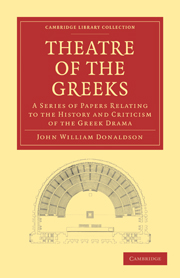Summary
A SKETCH OF THE PRINCIPAL USAGES OF THE MIDDLE VOICE OF THE GREEK VERB,
WHEN ITS SIGNIFICATION IS STKICTLY OBSERVED.
Qui bene dividit, bene docet.
The first four may be called usages of reflexive: the fifth the usage of reciprocal signification.
I. Where A does the act on himself or on what belongs to himself, i. e. is the object of his own action.
Ἀπήγξατο, he hanged himself.
Ὤιμωξεν δ' ὁ γέρων, κεϕαλὴν δ' ὅγε κόψατο χερσίν.
Iliad. X. 33.
II. Where A does the act on some other object M, relatively to himself (in the sense of the dative case put acquisitively), and not for another person B.
1. A κατεστρέψατο τὸν Μῆδον.
He made the Persian subject, or subdued him, to himself.
A κατέστρεψε τὸν τὸν Μῆδον τῷ B. res prorsus alia.
2. To this usage belongs the following:
Κοινῇ ἀπωσάμενοι τὸν Βάρβαρον. Thucyd. 1.18, et similia.
III. Where A gets an act done for himself, or for those belonging to him by B.
1. Of Chryses it is said, λυσόμενος θύγατρα, to get his daughter released by Agamemnon, on the payment of a ransom, that is, briefly, to ransom his daughter.
- Type
- Chapter
- Information
- Theatre of the GreeksA Series of Papers Relating to the History and Criticism of the Greek Drama, pp. 491 - 522Publisher: Cambridge University PressPrint publication year: 2010



